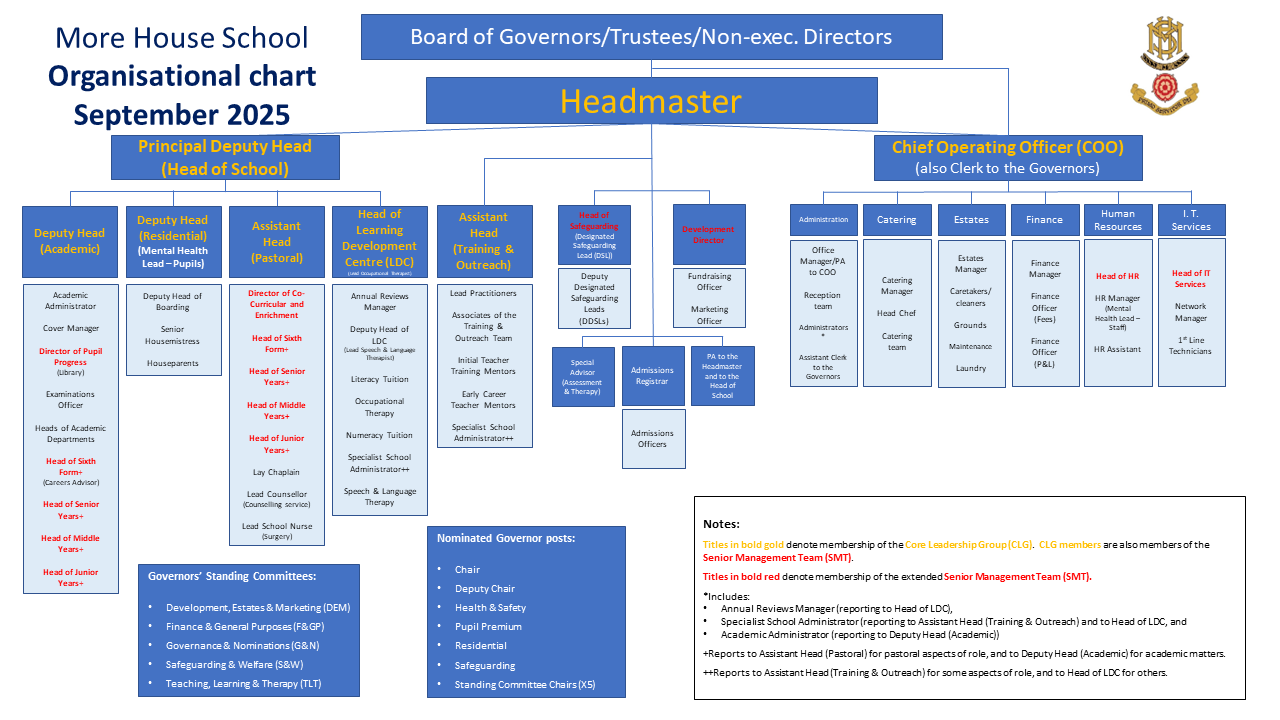Statement of Purpose
Our vision is to lead in transforming the futures of intelligent children who experience Specific Learning Difficulties, Developmental Language Disorder and associated conditions, by empowering them.
A more accessible, pupil-friendly PowerPoint version of this Statement of Purpose can be found at the bottom of this page.
Overall Purpose
Our School's purpose is to enable boys who are intelligent to overcome the barriers to learning and success posed by specific learning and language difficulties, and associated special educational needs. Too many pupils arrive at More House School with weak self-esteem and belief, very aware of areas in which they feel they are not clever. We believe that it is important that our boys are helped to discover and recognise their strengths so that they build their self-esteem and confidence.
We seek to instil self-belief, and encourage every pupil to have high aspirations for himself. It is important that our pupils become comfortable with who they are, recognising that everyone has within their character areas of strength and areas of weaker skills. This confidence and aspiration lead our pupils to achieve astonishing academic results and social outcomes. Our pupils leave More House with the skills and understanding necessary to be independent, self-sufficient and active members of society. They have developed a broad understanding of, and promote the differing views and experiences of our multicultural, international society.
In short, our purpose is to empower all our pupils to transform their futures.
Our School promotes the moral teachings of the Christian faith within the traditions of the Roman Catholic Church, but teaches tolerance and understanding of other faiths and cultural beliefs, and promotes freedom of expression and personal choice. The complementary attributes of respect and a keen curiosity are strongly encouraged in all pupils. Our School welcomes and supports pupils, adults and their wider families who may be of any religious faith or none.
At the centre of our approach are our three core values, of
kindness, spirit and responsibility.
These values underpin our School’s curriculum, extra-curricular provision, and staff and pupil policies and processes, including those supporting pupils’ pastoral care, wellbeing and behaviour.
All teachers, therapists, members of the boarding house staff and the teaching-support staff, share a commitment to continued professional development such that the delivery of curriculum and therapy, and all aspects of pupils’ School experience – academic and social – are informed by an understanding of each pupil’s strengths and weaknesses, maximising their self-belief and progress.
Specific aims
|
To support the individual needs of each pupil, as individuals, so that each thrives, adapting continuously our teaching and support strategies to challenge appropriately pupils’ diverse strengths and weaknesses. |
|
To provide all pupils with an environment in which they feel, and are, safe and confident in being themselves, and through which they develop effective skills to promote their mental health and wellbeing. |
|
To foster in all pupils a powerful desire to question and to learn, so that they develop insight into themselves and build self-value and belief, realising high aspirations for their future in terms of continued education and learning, their professional career, and social relationships. |
|
To provide a transformative learning environment and opportunities for our pupils so that they achieve outstanding academic results, above the national age-related averages, both at level two and three, despite having Specific Learning Difficulties, Developmental Language Disorder and associated special educational needs. |
|
To develop our pupils to become confident and resilient young people, with the experience and skills that allow them to lead independent lives within a modern world, and with the desire to be involved in society. |
|
To foster amongst all pupils an understanding, care and tolerance of all others, within the School’s Roman Catholic ethos and in accordance with the fundamental values of democracy, the rule of law, individual liberty, and mutual respect and tolerance of those with different faiths and beliefs. |
|
To collaborate with and promote research into the education and support of children and young people with language-related educational difficulties, using research to improve educational outcomes for all pupils, including those in other educational settings, through delivering the highest quality professional development, training and support to promote best-practice. |
Curriculum Provision
Our School provides education and pastoral care for boys between the ages of eight and nineteen, and provides boarding provision for boys between the ages of ten and nineteen. The academic curriculum, based on the National Curriculum but with wider scope, is deliberately broad, affording pupils experience of a wide range of learning opportunities. Whilst our pupils often arrive with attainment levels in some aspects of their learning far behind age-expected scores for their neurotypical peers in mainstream schools, we believe that for many of our pupils their real areas of natural aptitude lie in wider areas of the curriculum; for example, problem-solving in Computer Science, Computer-Aided Design or in Engineering, or creativity in the performing arts or the visual arts. Thus, affording our pupils a very broad, academic curriculum, enables them to realise their strengths, and to be challenged in them, as well as being supported to develop in their weaker skill areas.
The extra-curricular provision is similarly broad, comprising the clubs and activities programme, the boarding activities programme, day and residential off-site visits, arts and sports competitions, special events, interactions with pupils from other schools, the World Challenge and Duke of Edinburgh's Award programmes, and charitable fund-raising. With such a vast array of educational opportunities, each pupil explores his own character, finding areas he especially enjoys, discovering his strengths and developing new skills.
Overseen by the Assistant Head (Pastoral), a comprehensive Personal, Social, Health and Economics Education (PSHEE) curriculum is delivered through taught Personal and Social Development (PSD) lessons and complemented by assemblies, visiting speakers, off-site visits, special School events, academic subject lessons and the School's normal pastoral provision. The PSD curriculum includes Relationships and Sex Education (RSE), and promotes strongly those identified as being the fundamental British values of democracy, the rule of law, individual liberty, and mutual respect and tolerance of those with different faiths and beliefs. It also supports the spiritual, moral, social and cultural development of pupils.
Pupils are grouped into academic-year groups, from Year Four to the Upper Sixth. The academic curriculum is taught in classes of normally between ten and fourteen pupils, and every pupil will study and be assessed in a broad range of GCSE level courses, completed at the end of Year Eleven. Pupils in the Sixth Form will study A Level courses or other qualifications at a similar level, or may study a combination of A Level and GCSE level courses. For Year Nine, pupils select six options subjects to pursue in addition to the core subjects of English, Mathematics and the sciences. At the end of Year Nine pupils confirm those options subjects which they will study in years Ten and Eleven in addition to the core subjects.
Importantly, we provide no one-to-one classroom support or tutoring, and no withdrawal from class to work alone or in a small group. We recognise the detrimental social impact of such practices, the ineffective high provision costs associated with them, and the damage caused to promoting pupils’ academic and social confidence and belief in themselves, and their growth in independence. However, many of our pupils will have experienced such interventions in their previous school settings, representing the best efforts of a non-specialist, mainstream environment.
At the heart of our School’s approach to teaching and learning is an evidence-informed, whole-class inclusive teaching approach – for every age group and every subject – carefully designed to foster in pupils a realisation of their own potential and efficacy. This is delivered through deliberate adaptation of teaching methods to ensure that all pupils can access the learning and acquire the skills to be successful. They will then be able to make the best possible progress and achieve the best possible outcomes, both academically and socially. They need to enjoy the experience and develop the courage to commit, take risks and move beyond their comfort zone.
The four key areas of learning our teachers support in the classroom and beyond are:
Language – Attention – Working Memory – Processing
We do not teach to the diagnosis. We recognise that all diagnoses share difficulties with Language, Attention, Working Memory and Processing. We use a range of basic but highly effective strategies to support our pupils.
The following figure provides an overview of the oversight and management of the teaching, learning and therapy provision:
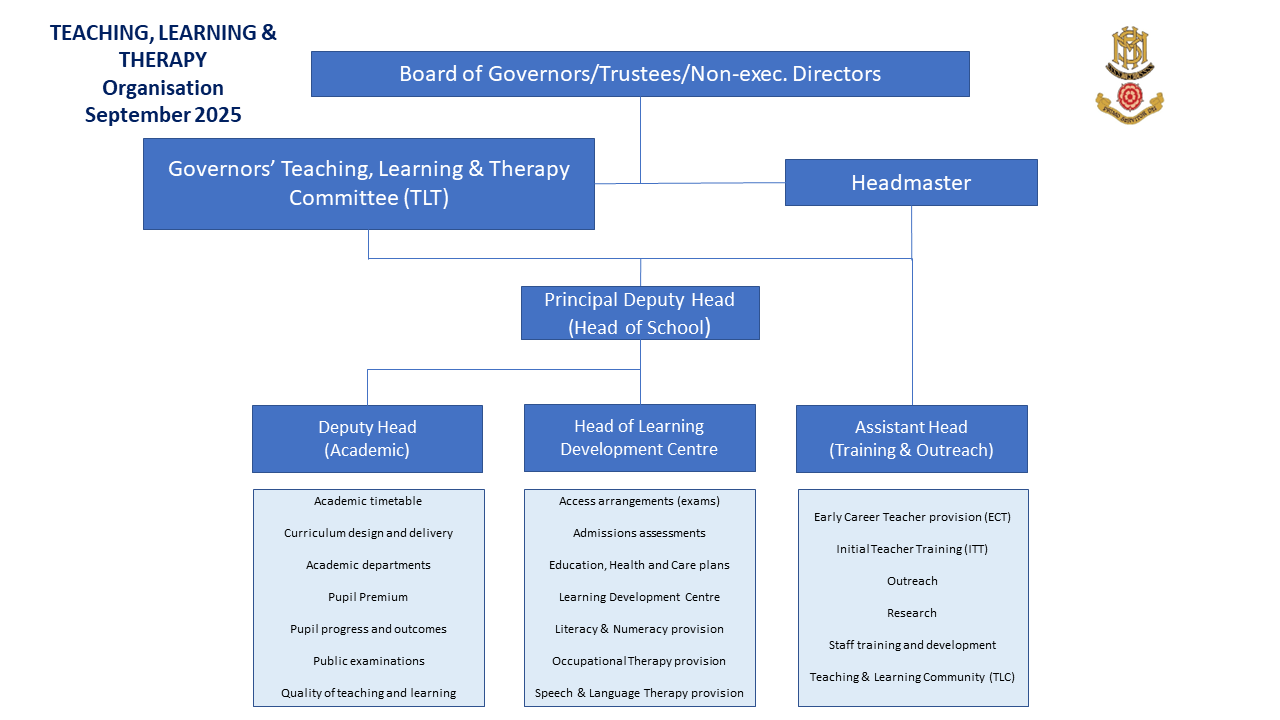
Tracking Progress
Each pupil’s parent or carer is able to access, at any time, their son’s record of overall progress, and engagement in his learning, by viewing the half-termly Progress Monitoring Grades sheet, published to the Parent Portal of our Management Information System (MIS), and updated with new information six times a year.
Parents are also invited to at least one parent and teacher consultation evening (Parents’ Evening) per year, and are expected to attend an in-depth annual review meeting in order to share in examining progress, especially in relation to the pupil’s therapeutic skills targets. Close communication between parents and the School is encouraged throughout the academic year.
At the end of the year, parents receive a detailed, annual School report addressing the progress and engagement of their sons in all academic subjects, in their pastoral development, in respect of the residential provision where applicable, and in all therapeutic disciplines other than counselling.
Pastoral Provision
Pupils' pastoral needs are met through a system of year-group staff teams comprising form-tutors, led by a Head of Year, who also monitor pupils' academic progress. Pupils meet with their form-tutor for morning registration at 8.30am each school morning, and again for afternoon registration and form-time at 4pm each afternoon. This input is vital in order for pupils to build a very close bond with the School itself, developing trust and receiving praise and challenge accordingly.
Upon admission to the School, all pupils and employees join one of the four School houses, celebrating historical, Farnham-based figures: Cobbett, Hawthorn, Knight and Sturt. Pupils recognise a close allegiance to their house and are reminded of this by the colour of their School tie or on their polo-shirt if a junior-years pupil. Houses enjoy a ceremony at the end of each half-term, in recognition of their collective successes. This also provides an opportunity to award the collective, half-termly house-point prize, which is accompanied by delicious treats!
Pupils receive house-points in the following areas, matching our core values:
Kindness
Spirit
Responsibility
Pupils receive awards from the achievement of 50 (Bronze), 125 (Silver), 200 (Gold) and 300 (Platinum) house-points.
The More House School Behaviour for Learning policy also challenges negative behaviour or interaction through a range of ‘consequences’, or sanctions. There is a broad understanding from all staff members that the development of attitude and approach comes through educational opportunity, and every element of the Behaviour for Learning process enables guidance and development, provided by form-tutors, heads of year and the Assistant Head (Pastoral), where appropriate. The development of attitude, defined through kindness, spirit and responsibility, is at the forefront of our approach and enables pupils to be better prepared for the rigours of academic progression.
The wider pastoral team, inclusive of our Crew (comprising input from Safeguarding, Pastoral, Surgery, Counselling, Admissions and Attendance) system, manages pupils' needs that require support beyond that provided within the regular pastoral support arrangements, and it coordinates activities of the School medical surgery team, the Head of Safeguarding (Designated Safeguarding Lead (DSL)) and DSL deputies, the Mental Health Lead and therapeutic counsellors, and any other members of the staff. Alternative methods of intervention may be implemented depending on the identification of need. There is a named governor with special interest in our School’s Safeguarding provision.
The following figures provide an overview of the oversight and management of the Safeguarding and Welfare provisions, including the organisation of pastoral care:
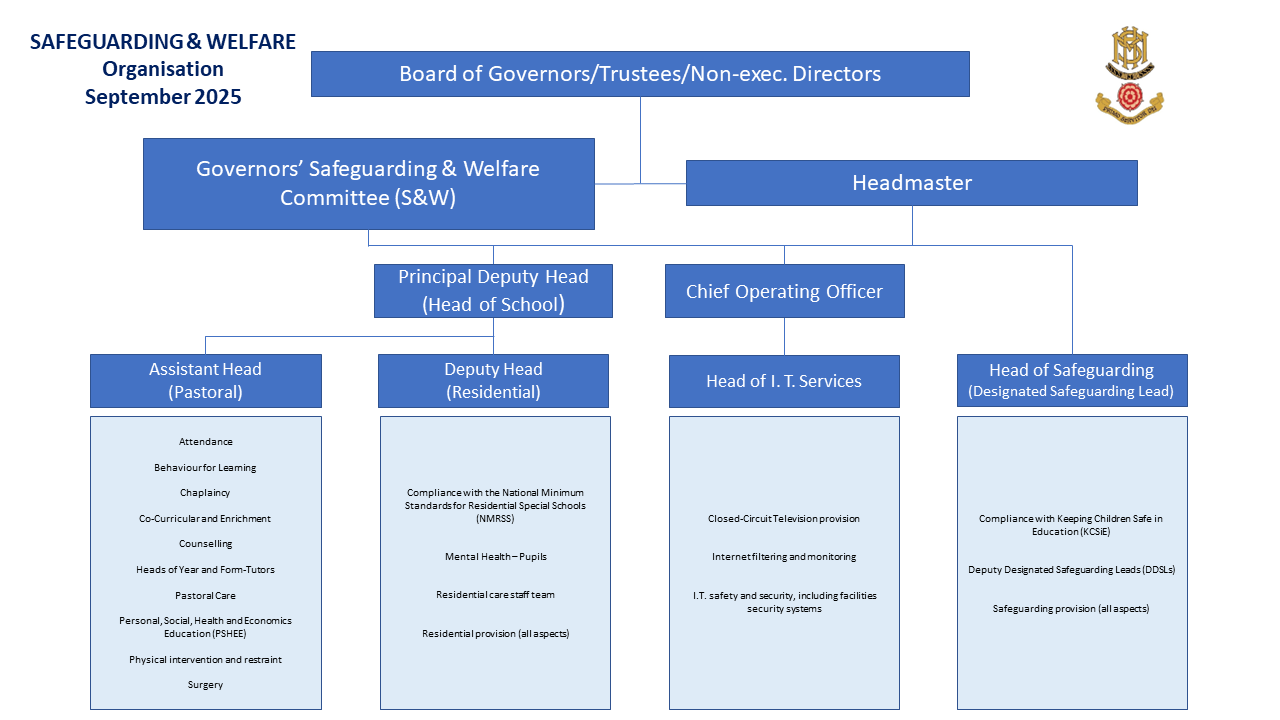
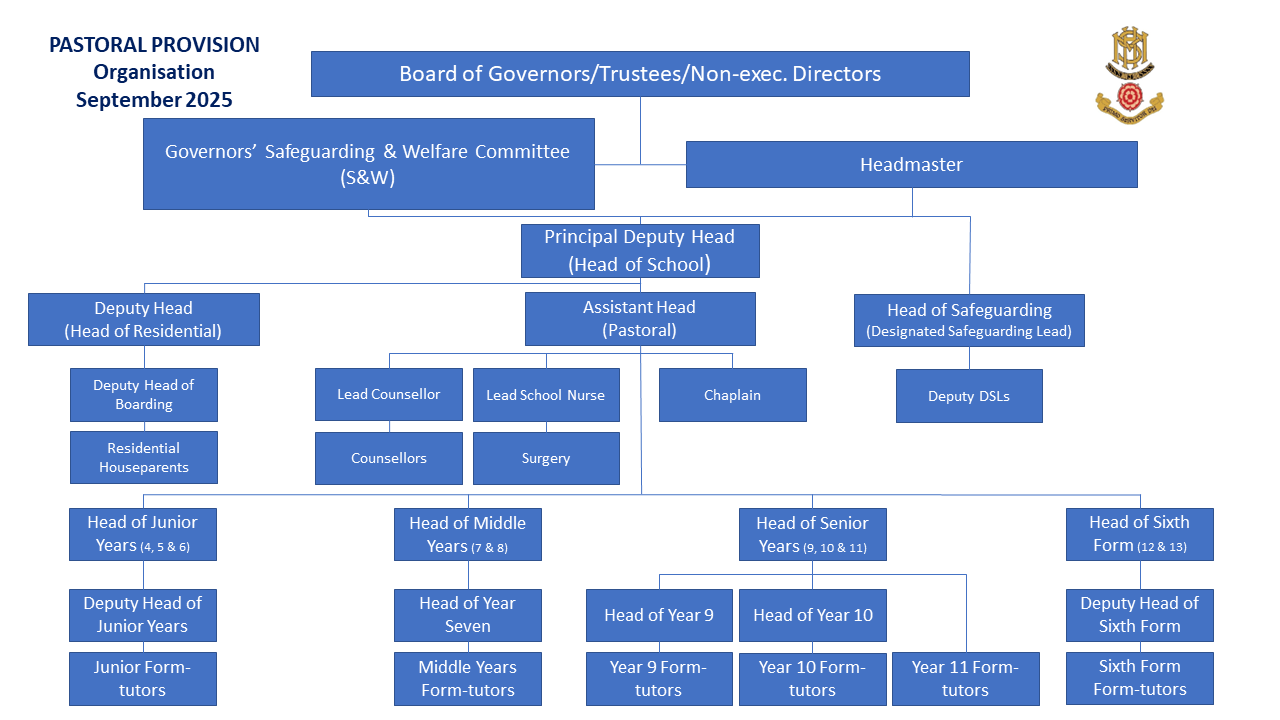
Boarding Provision
There can be no substitute for a loving, caring family home, and our School does not seek to be such a substitute. However, the sense of community and the facilities available to boarders enables the School to foster boarders' social confidence and to develop their skills and interests. We believe that we can make life for our boarders stimulating and happy, by providing an environment in which they are cared for and supported by a partnership between each pupil's parents or carers and the School. We seek to enable each boarder to make use of the School's specialist provision and facilities when the distance between home and School would otherwise preclude it, or in support of building pupils’ social inclusion through the unique opportunities afforded by boarding. ‘Boarding by choice’ is one of our central philosophies.
The following aims and guidelines, informed by our core values of kindness, spirit and responsibility, shape our approach to fostering each boarder's wellbeing, safeguarding and development:
- to provide an environment where boys staying away from home are cared for physically, emotionally and spiritually;
- to help every child and young person to grow to his full maturity as a member of a thriving, caring and happy, shared community;
- to provide as great a wealth as possible of meaningful and enriching experiences, from which each boarder may choose to allow his individual tastes and preferences to grow his own balanced, fulfilled and distinctive personality.
Pupils may board as full boarders, remaining in School most weekends during term-time, and returning home every School holiday, including half-term holidays, and also every Exeat weekend (there is one in the middle of each half of a term). Boarders may board as weekly boarders, returning home every Friday afternoon and travelling back to School either on Sunday evenings, or on Monday mornings before the School day commences. Some boarders stay fewer nights each week.
Each boarder is supported by a named residential houseparent, directly responsible for between eight and fifteen boarders within a larger residential staff team, led by the Deputy Head (Head of Residential). Boarding accommodation comprises two boarding houses – Main House for younger boarders and St Anthony’s House for boarders in Year Ten or older. Both are located in the centre of the School campus. Only boarders have access to these facilities, and then only before and after School hours.
Boarders are supported to develop their interests in a wide variety of activities and opportunities, and to develop their social skills and their independence. Boarders are encouraged and supported to be personally involved in planning with their houseparent how they can best be cared for as a boarder at More House School.
Residential staff engage in a termly professional development review conducted by the Deputy Head (Head of Residential). In the Trinity (summer) term, this takes the form of an annual appraisal.
The governors appoint an independent visitor to visit the residential provision six times a year, unannounced, completing on each occasion a written report on the quality of the residential provision, which is provided to the Headmaster and to the governors’ Safeguarding and Welfare Committee. There is also a named governor with special interest in the residential provision.
The School appoints at least one independent person, who visits regularly and whom children may contact directly about personal problems or concerns.
The following figure provides an overview of the oversight and management of the staffing for the residential provision:
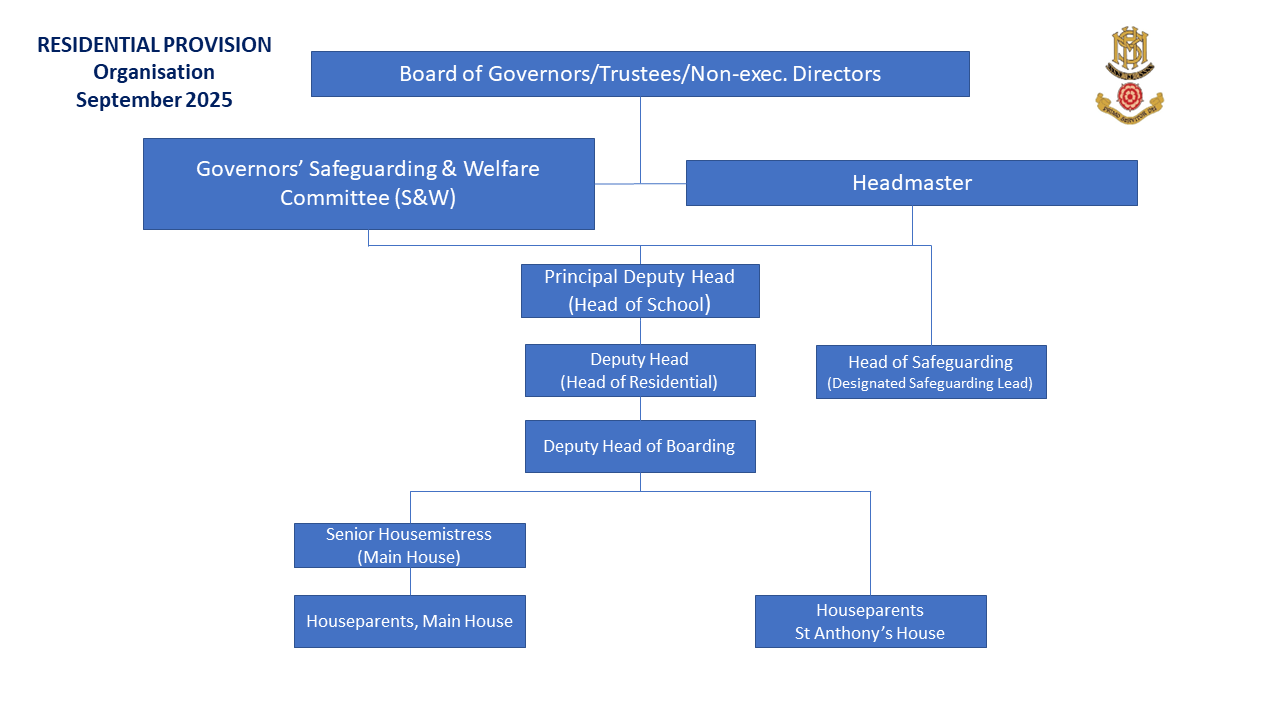
Pupil Voice
Our School Council forum is run entirely by pupils and comprises representatives from every age-group in our School, who meet regularly to discuss all aspects of the School's provision and organisation from the perspective of its pupils. There is also a Boarders' Council which meets weekly, and a Food Council representing day boys and boarders of all ages, which convenes termly to meet with our School's Catering Manager and Chief Operating Officer (COO).
Supporting Pupils' Individual Needs
Our School's admissions process is designed to establish a match between a prospective pupil's cognitive, learning, social and physical profile, and the School's provision. Each pupil is assessed prior to entry for his learning difficulties, literacy needs, Speech and Language Therapy needs, Occupational Therapy needs and numeracy needs. This assessment informs an individual plan of appropriate targets which is then supported through the School's one-to-one mentoring programme for every pupil.
Every pupil is the subject of an Annual Review meeting in which he, his parent/carers and a member of the teaching or therapeutic staff meet to assess progress made towards the targets, to evaluate the provision in place for him and to set new targets for the following twelve months. In the case of pupils whose placements are funded by their local authority, a representative of the local authority is also invited to attend, and the Education, Health and Care plan is reviewed to ensure it is fit for purpose.
A pupil's individual targets are addressed in small-group therapeutic lessons provided by the School's fully qualified and registered Speech and Language Therapists, Literacy Tutors, Occupational Therapists and Numeracy Tutors.
Speech & Language Therapists hold a Speech & Language Therapy degree or equivalent, are members of the Royal College of Speech & Language Therapists (RCSLT) and are registered with the Health Care Professionals Council (HCPC). Speech & Language Therapy Assistants are supervised in their work by one or more of the School’s qualified Speech and Language Therapists.
Occupational Therapists hold an Occupational Therapy degree or equivalent, are members of the Royal College of Occupational Therapists (RCOT) and are registered with the HCPC. Occupational Therapy Assistants are supervised in their work by one or more of the School’s qualified Occupational Therapists.
Literacy and Numeracy Tutors hold a nationally recognised qualification, usually at Level 5 or 7.
These lessons take place in the Learning Development Centre (LDC). Such intervention is specific to each individual pupil according to his identified needs, and progress is monitored and reported on to parents in the same way that progress and attainment in academic subjects are reported.
This specialist provision forms part of the pupil's normal timetable so that no pupil misses any part of another lesson in order to receive support. Each pupil's weekly mentoring challenges are addressed in each of his academic subject lessons so that progress towards his identified targets is not just supported in the Learning Development Centre but integrated throughout all aspects of his education.
Our school's qualified and BACP-registered therapeutic counsellors provide short or longer-term one to one support for pupils identified through the Pastoral Provision Plus system. In addition to qualifications and BACP-registration and approval, the School’s therapeutic counsellors are subject to regular professional supervision and are part of the therapeutic staff team.
A shared approach between the teaching, therapeutic and boarding staff teams is essential to the effective support and development of all pupils. These three teams meet together formally at least three times every year to share experience and approaches, to discuss future developments, and to complete shared training. Additionally, during term time, the teaching and therapy staffs meet twice-weekly before the start of the School day, joined by representatives from the boarding team. The boarding staff team meets together at 4pm each School day, joined by one of the School nurses and often by representatives from the teaching and year-group staff team.
The following figure provides an overview of the oversight and management of the staffing for the therapeutic provision:
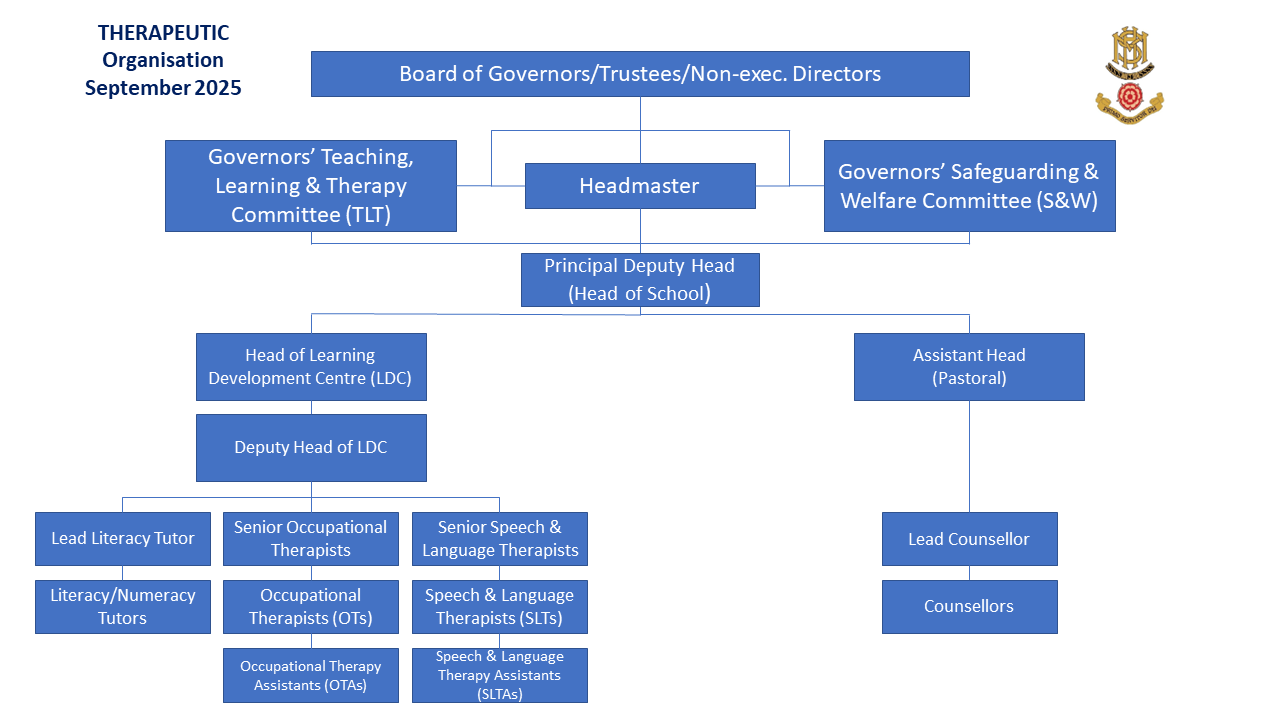
Outreach
More House School is committed to improving access to its unique approach and benefits, for children, young people and educational professionals beyond the School gates, and supports the development of teaching assistants, teachers, therapists, SENDCos, senior leadership teams and governors through training coordinated by the School’s Assistant Head (Training & Outreach), other senior leaders and other members of the Training & Outreach Team.
Now internationally recognised as a centre of excellence in the provision of transformational educational, social and residential provision for intelligent boys with Specific Learning Difficulties, Developmental Language Disorder and associated conditions, More House School is ever-developing its reputation for the highest quality professional development and training of practitioners in these areas. Our School delivers a wide breadth of training opportunities for School and external professionals, including:
- Spotlight seminar series – a provision of twilight seminars covering a wide variety of SEND subjects, offered free of charge to teaching assistants, tutors, teachers, SENDCos, school leaders and governors from local and more distant schools, both in the state-maintained and independent sectors and in primary and secondary age-groups.
- CPD-accredited Level 3 Effective SEND Support award.
- CPD-accredited Level 4 Approaches to SEN in the Classroom award.
- Support of universities’ Initial Teacher Training (ITT) programmes through the provision of lectures relevant to supporting neuro-atypical and SEND learners.
- On-site and peripatetic advisory visits supporting schools in the development of effective understanding of, and provision for, SEND and neuro-atypical learners.
- Delivery of in-service training for staff in schools, including an online 90-minute introductory awareness course.
- Design and delivery of SEND training nationally for the Independent Schools Association (ISA), including the ISA training for SENDCos.
- Engagement in the design and delivery of the National SEND Conference in association with the Independent Schools’ Council (ISC) for the Independent schools’ sector.
Our School holds ambitious plans for the continued development of its Outreach provision, supporting schools internationally, promoting excellence in support and outcomes for children and young people disadvantaged by special educational needs.
Business Operations
Departments whose work is not primarily focused on pupil-facing activity are collectively recognised within our Business Operations framework. Oversight and management is arranged in accordance with the following diagram:
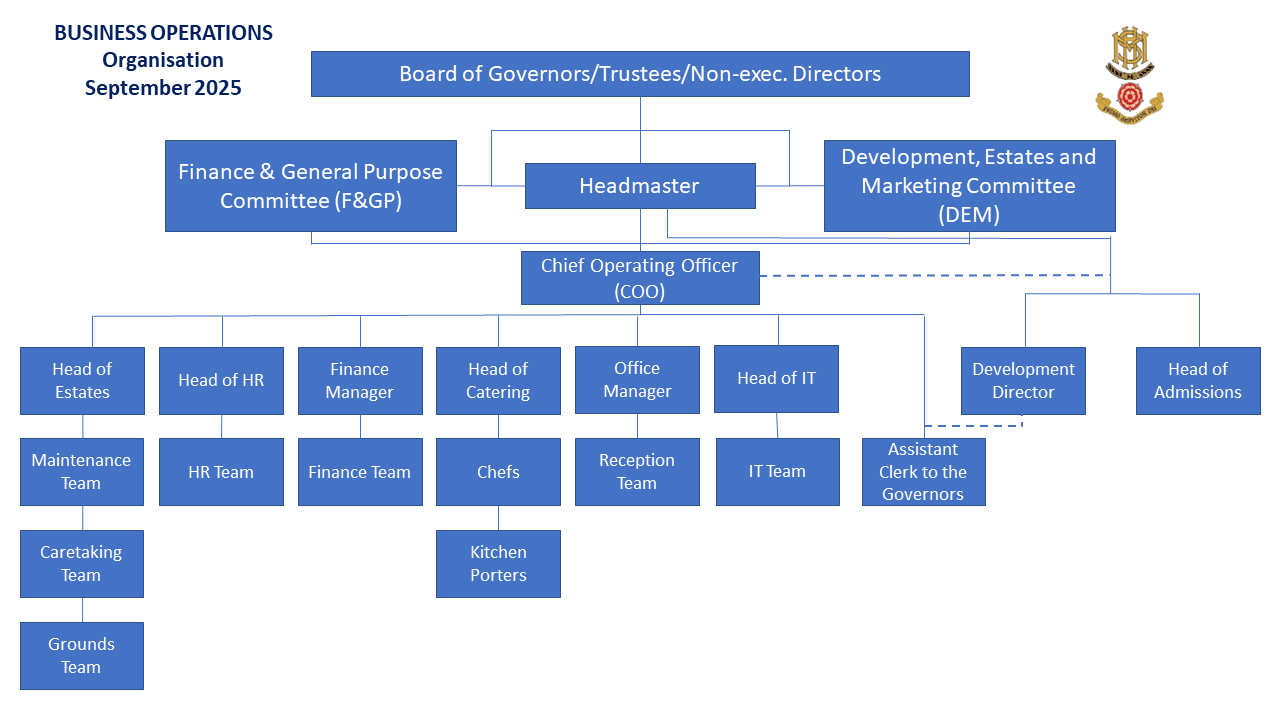
Organisational Structure
The School’s governance, leadership and management is organised in accordance with the following diagram:
